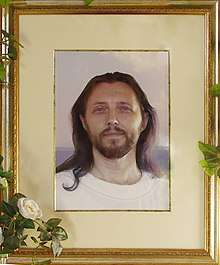Vissarion
Sergey Anatolyevitch Torop (Russian: Серге́й Анато́льевич То́роп, Sergej Anatolʹevič Torop; born 14 January 1961 in Krasnodar, Russian SFSR), known by his followers as Vissarion (Russian: Виссарио́н, IPA: [vʲɪsərʲɪˈon], "He who gives new life"), is a Russian mystic and spiritual leader.
Vissarion | |
|---|---|
 Photograph of Vissarion displayed in Petropavlovka | |
| Other names | Vissarion |
| Personal | |
| Born | Sergey Anatolyevitch Torop 14 January 1961 Krasnodar, Russian SFSR, Soviet Union |
| Religion | Christian based new religious movement |
| Nationality | Russian |
| Children | Roman Daria Elisha Svetoger Svyatoslav Diana |
| Parents | Anatoly Torop and Nadia Malashenko |
| Other names | Vissarion |
| Church | Church of the Last Testament |
On 18 August 1990, when he was 29, Vissarion claims that he had a revelation that he was the reincarnation of Christ. He first spoke publicly in Minusinsk on 18 August 1991. He founded the "Church of the Last Testament" (Церковь Последнего Завета Tserkov Poslednego Zaveta), also known as "Community of Unified Faith", with its head church located in the Siberian Taiga in the Minusinsk Depression east of Abakan, in the small settlement of Petropavlovka. He teaches reincarnation, vegetarianism, and apocalypse. He has around 4,000 followers (called Vissarionites) living in the settlement and around 10,000 followers worldwide.[1]
Biography
Vissarion was born in Krasnodar to Anatoly Torop and Nadezhda (née Malashenko); after service in the Red Army, he settled in Minusinsk. He worked as a patrol officer before losing his job in 1989.[2] He claims that in 1990 he was "reborn" as Vissarion, a returned Christ. In his system this does not make him God, but instead the word of God. His religion combines elements of the Russian Orthodox Church with Buddhism, apocalypticism, collectivism, and ecological values.
His followers observe strict regulations, are vegetarians,[3] and are allowed no vices such as smoking or drinking alcohol, and money is banned.[4][5] The aim of the group is to unite all religions on Earth. Vissarion formed his religion around the time of the fall of the USSR.[6]
Tiberkul, the settlement in the Taiga, was established in 1994 on a territory of 2.5 square kilometres (620 acres), and today the community spans several nearby villages as well, including villages of Petropavlovka and Cheremshanka, at ca. 56°37′N 96°12′E, and counts some five thousand inhabitants, largely living autochthonous and on ecological principles. The central settlement, also called The Town and The Mountain, has a three-tiered structure: the Town itself (Abode of Dawn), the Heavenly Abode, and the Temple Peak.
In October 1995, the religious association of Vissarion officially registered as the "Church of the Last Testament".
Personal life
Vissarion has two wives, and six children from two marriages. He rejected his first wife and married a nineteen-year-old who had lived with him since she was a girl of seven.[7]
Vissarion has a younger half-sister, Irina. Though his biological mother is a woman named Nadyezhda, Vissarion considers Mary, mother of Jesus, as his own mother.[8]
Interpretation
Since 1992, biographer Vadim Redkin has published an annual volume detailing Vissarion's activities. Vissarion has attracted a number of followers from Germany's esoteric subculture, and seven volumes of Vadim's account have been translated into German.[9]
In May 2012, the Vice YouTube channel released "Cult Leader Thinks He's Jesus (Documentary Exclusive)", containing a report by Rocco Castoro, a reporter for Vice in Petropavlovka, and his interview with Vissarion.[10] The video depicts the settlement and the people as a very nice place with good people, but the ideas of the group as very cultish. This was the first time Vissarion had granted an interview in three years.
In a video released in January 2014 by RT, titled "Siberian 'Messiah'", Vissarion predicts a great flood and promises salvation and spiritual perfection to his followers.[11]
See also
- Christianity in Russia
- List of people who have claimed to be Jesus
References
- Obscura, Atlas. "Russian Cult May be The Largest Religious Reservation In The World". Slate.com. Retrieved 1 November 2013.
- Сибирский Иисус Христос - бывший гаишник
- The Argus, Brighton 2002 Archived 2009-02-15 at the Wayback Machine
- The Vissarion Cult in Russia - Lermanet, November 6, 2003
- 'Reborn' Jesus Leads Vegans in Russia - Newser, August 29, 2009
- "Cult Leader Thinks He's Jesus (Documentary Exclusive)". VICE News. 16 May 2012. Retrieved 24 April 2016.
- Семён Максимов."Позови меня в даль светлую" или сказки дядюшки Виссариона//Миссионерское обозрение, № 3,4,6, 1998
- Последний Завет. Т.1, СП-б, Фламинго, 1996, вопрос 24.
- Vissarion
- Cult Leader Thinks He’s Jesus
- 'Messiah' (RT Documentary)
External links
- Official Russian-language website
- Russian-language Last Testament
- English-language website
- English-language Last Testament
- Vissarion Community International Portal
- Vissarion's Personal page (Russian)
- Orthodox church and Vissarion
- Film of BBC A Long Weekend with The Son of God (Filmmaker George Carey).
- Stanislav Krupar's photos of Vissarion community
- Globe and Mail: Jesus Lives
- The Washington Post: Novel Faiths Find Followers Among Russia's Disillusioned
- The Guardian on him
- Section in news about religion in Russia listed under "Sect in Siberia
- Sydney Morning Herald article
- ABC Nightline video and article
- Vice Guide to Travel: Jesus of Siberia
- Russian-language profile and critique
- Cult Leader Thinks He’s Jesus
- Reincarnated Jesus' Secluded Siberian Sect